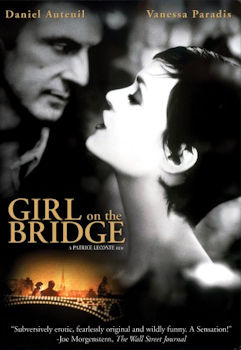GIRL ON THE BRIDGE
(LA FILLE SUR LE PONT)
Released: 1999
Directed By: Patrice Leconte
French with English subtitles
Cast:
Daniel Auteuil: Gabor
Vanessa Paradis: Adele

GIRL ON THE BRIDGE
|
|
Review by Michael Dequina, FilmThreat.com
Very few actors, let alone young ones, can pull off what 20-something chanteuse-turned-actress Vanessa Paradis does in the opening minutes of Patrice Leconte’s romantic drama. In a single take broken only by an occasional white-on-black credit card, Paradis’ Adele confides to an unseen interrogator the reasons for her depression. It is never explained exactly to whom she is speaking and in what type of situation, but that is of little consequence—in these scant minutes, the audience instantly is given a vivid portrait of what the character is all about: her youthful recklessness and naïveté, her sexual abandon and her romantic soul. While kudos go to writer Serge Frydman, it is Paradis who brings the scene and Adele to robust life.
However, in Adele’s eyes, her life isn’t quite so healthy, and as such she becomes the titular girl on the bridge, ready to jump when she meets Gabor (Daniel Auteuil), a knife thrower in need of a new target. Since she clearly has no fear of danger, Adele is a perfect match—though it comes as a surprise to both of them just how well they complement each other, for these two historically down-on-their-luck characters find themselves on an incredible streak of good fortune as they wow crowds throughout Europe. But as with all things, what goes up must come down.
La Fille sur le Pont is a magical film in all senses. On a literal level, the surreal psychic bond that develops between Adele and Gabor pushes the film into the realm of magical realism, and their knife throwing scenes bear a not-so-subtle, otherworldly erotic charge. But the real magic comes in watching the warm sparks between Paradis and Auteuil and following their eccentric characters’ beautiful, unconventional relationship. Jean-Marie Dreujou’s stunning black-and-white cinematography and Leconte’s smart choices in music (there is no original composed score) add to the film’s whimsical, timeless spell.
Review by Max Messier, FilmCritic.com
It’s always rewarding to find in today’s cinema a stark reminder of how powerfully the emotion of love can alter perception, reality, and reason within a person. Girl on the Bridge is one of those stark reminders, a brutally grim and honest film of unacquainted desire and the fearful reservations that follow two individuals looking for that unattainable completion of one’s faith and one’s heart.
This disturbing and brilliant new film by renowned French filmmaker Patrice Leconte—director of such films as Monsieur Hire, The Hairdresser’s Husband, and Ridicule—follows the tale of Adele, a lovelorn girl who has been through too many one night stands and promises of purposes. She remarks in an unflinching five-minute opening monologue, “I see my future like a waiting room in a train station, and I sit there waiting for something to happen.” In this grim monologue, director Leconte portrays Adele, played with striking beauty and poise by French singer Vanessa Paradis, as neither a slut nor a vixen but as an emotionally confused girl who doesn’t understand the difference between love and sex.
Later that night, Adele ends up on the edge of a bridge overlooking the Seine, contemplating the murky waters below. From the darkness appears an older man named Gabor, played by the great French actor Daniel Auteuil, a knife-throwing expert in need of an assistant for his performances. He tries to dissuade Adele from jumping but fails and she ends up in the river; naturally, he jumps in and saves her. While in the hospital, Gabor convinces Adele that her luck is changing by demonstrating his extrasensory talents. She joins him as his assistant, and during their first performance, Adele develops a telepathic link with Gabor that directs his blades. Their journey continues to places such as Monaco and San Reno as Adele and Gabor use their clairvoyance to win big at casinos and amaze audiences with the knife-throwing performances. But their relationship sours because of the attention Adele gets, and the film gets more disturbing from there.
Director Patrice Leconte chose to shoot the film in black and white to add to the timelessness of the picture. He also chose a variety of music, such as Benny Goodman, Marianne Faithful, Brenda Lee, and the Istanbul Oriental Ensemble, to make the movie sound quite diverse. The tight dialogue follows a solid pattern of delivering poignancy with the pretensions of the subject matter as Adele and Gabor subconsciously move toward each other’s hearts and minds. The telepathic connection between the characters is handled with conviction and makes you believe that the link is solely derived from the unity of the two minds and hearts.
The film also holds distinct elements of a dream state. The first moments of the film allow for an interpretation that the mysteries and travels of Adele are in fact the fantasies of a lonely and depressed girl looking for something, anything in this world. The direct honesty of Gabor and his unadulterated feelings for Adele seem to reach out to the audience and pull them into the complexity of his love and desire for this woman. His words are brutal but fair and demand no sympathy from Adele.
Admittedly, French cinema is a tough beast to understand. The stark dialogue is uncommon in American cinema and the development of characters is sometimes without a roadmap and lacks the emotional shortcuts of Hollywood. Good French cinema is powerful and demands your attention for full appreciation. Give Girl on the Bridge all of your mind.